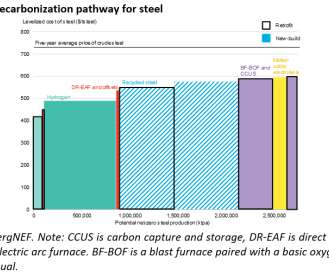BNEF: steel industry set to pivot to hydrogen in green push; additional $278B for clean capacity and retrofits
Green Car Congress
DECEMBER 1, 2021
Steel production could be made with almost no carbon emissions through $278 billion of extra investment by 2050, according to a new report from research firm BloombergNEF (BNEF). But continuing to build new coal-fired plants will leave producers with only bad options toward a net-zero future by 2050. Source: BloombergNEF.












Let's personalize your content